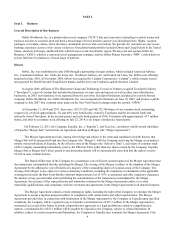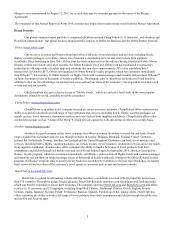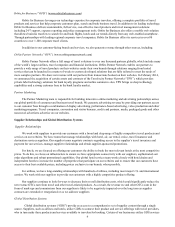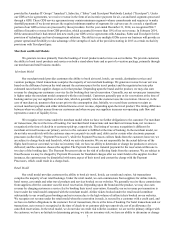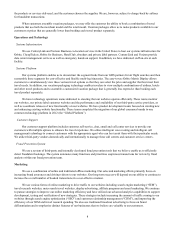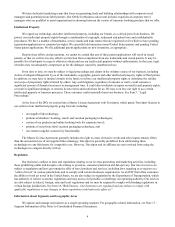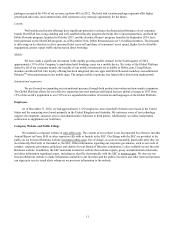Orbitz 2014 Annual Report Download - page 14
Download and view the complete annual report
Please find page 14 of the 2014 Orbitz annual report below. You can navigate through the pages in the report by either clicking on the pages listed below, or by using the keyword search tool below to find specific information within the annual report.14
The travel industry is highly competitive, and we may not be able to effectively compete in the future.
We operate in the highly competitive travel industry. Our success depends upon our ability to compete effectively against
numerous established and emerging competitors, including other OTCs, traditional offline travel companies, suppliers, travel
research companies, search engines and meta-search companies, which may have significantly greater financial, marketing,
personnel and other resources than we have. Factors affecting our competitive success include price, availability of travel
products, ability to package travel products across multiple suppliers, brand recognition, customer service and customer care,
fees charged to customers, ease of use, accessibility, reliability and innovation. If we are not able to compete effectively against
our competitors, our business and results of operations may be adversely affected.
Online travel companies: We face significant competition from other online travel companies, such as Priceline, Expedia,
Faceportal, TripAdvisor and their related brands, as well as other regional competitors such as Odigeo, Bravofly and e-travel.ie
in Europe. We compete with offline travel companies for both travelers and the acquisition and retention of supply.
Travel suppliers: Suppliers have increasingly focused on distributing their products through their own websites and
driving consumers away from OTCs. Suppliers may offer advantages for customers to book directly, such as member-only
fares, bonus miles or loyalty points, which could make their offerings more attractive to customers. Some low-cost airlines
distribute their online supply exclusively through their own website and other airlines have stopped providing inventory to
certain online channels and attempt to drive customers to book directly on their websites by eliminating or limiting sales of
certain airline tickets through third-party distributors. Additionally, airline suppliers are increasingly promoting hotel supply on
their websites in connection with airline tickets. Our results of operations could be negatively affected by such increased
competitive pressure from suppliers.
Search engines: We also face increasing competition from search engines like Google, Bing and Yahoo!. Search engines
have grown in popularity and may offer comprehensive travel planning or shopping capabilities, which may drive more traffic
directly to the websites of suppliers or competitors. Google has increased its focus on appealing to travel customers through its
launches of Google Places, Google Flights and Google Hotel Price Ads (“HPA”). Google’s efforts around these products, as
well as possible future developments, may change or undermine our ability to obtain prominent placement in paid or unpaid
search results at a reasonable cost or at all. In addition, we currently license our search functionality, QPX Software, from ITA
Software, Inc., a subsidiary of Google.
Travel meta-search engines and content aggregators: Travel meta-search websites and travel research sites that have
search functionality, including Kayak.com (a subsidiary of our competitor Priceline), Trivago.com (a subsidiary of our
competitor Expedia), and TripAdvisor, aggregate travel search results for a specific itinerary across supplier, travel agent and
other websites. If these competitors limit our participation within their results, it could affect our traffic-generating
arrangements in a negative manner. For example, our agreement with Kayak.com that provided for exclusivity with respect to
some of Kayak’s core search results terminated at the end of 2013 and was not renewed. In addition, some meta-search sites,
including Kayak.com, offer users the ability to make reservations directly on their websites, which may reduce the amount of
traffic and transactions available to us through referrals from these sites. If additional meta-search sites begin to offer the ability
to make reservations directly, that will further affect our ability to generate traffic to our sites.
Other competitors in the broader travel space: We also will continue to face competition from new channels of
distribution in the travel industry. Additional sources of competition include large companies that offer online travel services as
one part of their business model, such as Amazon and Alibaba, “daily deal” websites, such as Groupon Getaways, or peer-to-
peer inventory sources, such as AirBnB and HomeAway. AirBnB and similar websites facilitate the short-term rental of homes
and apartments from owners, thereby providing an alternative to hotel rooms. The growth of peer-to-peer inventory sources
could affect the demand for our services in facilitating reservations at hotels.
There can be no assurance that we will be able to compete successfully against any current and future competitors or on
emerging platforms, or provide differentiated products and services to our customer base. Increasing competition from current
and emerging competitors, the introduction of new technologies and the continued expansion of existing technologies, such as
meta-search and other search engine technologies, may force us to make changes to our business models, which could affect
our financial performance and liquidity. Increased competition has resulted in and may continue to result in reduced margins, as
well as loss of customer, transactions and brand recognition.
Our business depends on our supplier and distribution partner relationships. Adverse changes in these relationships or
our inability to enter into new relationships could negatively affect our access to travel offerings and reduce our
revenue.


